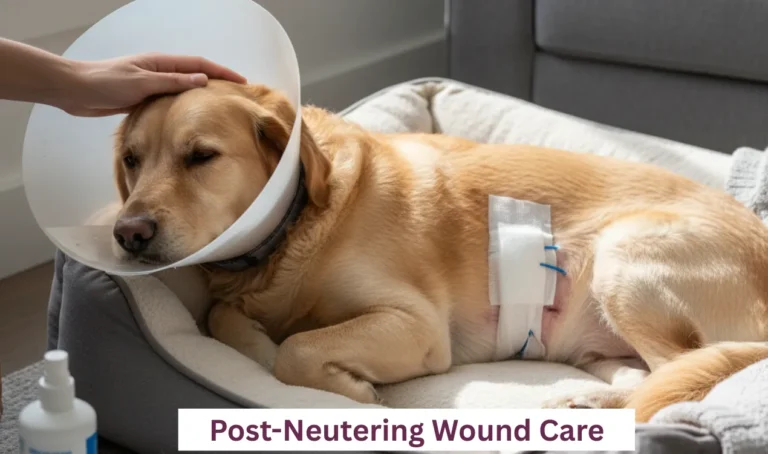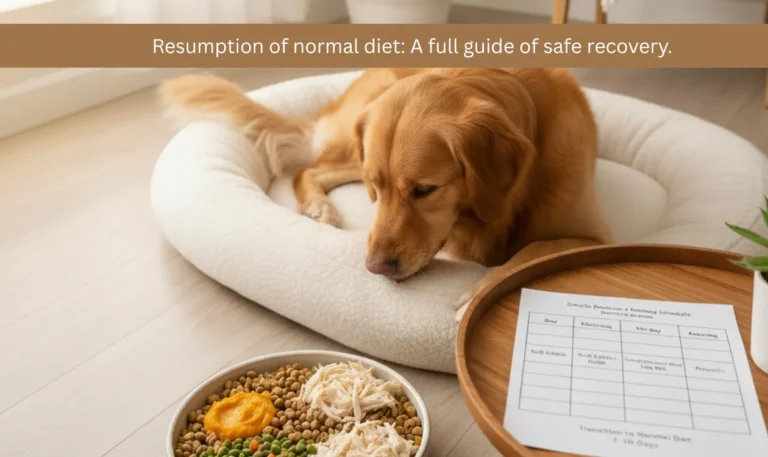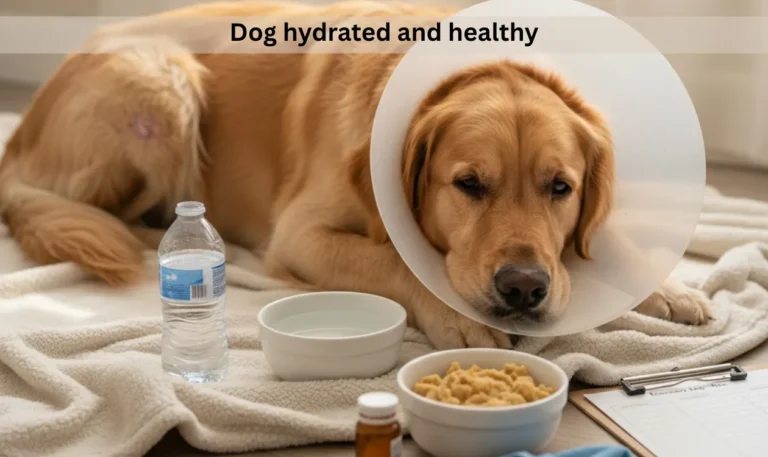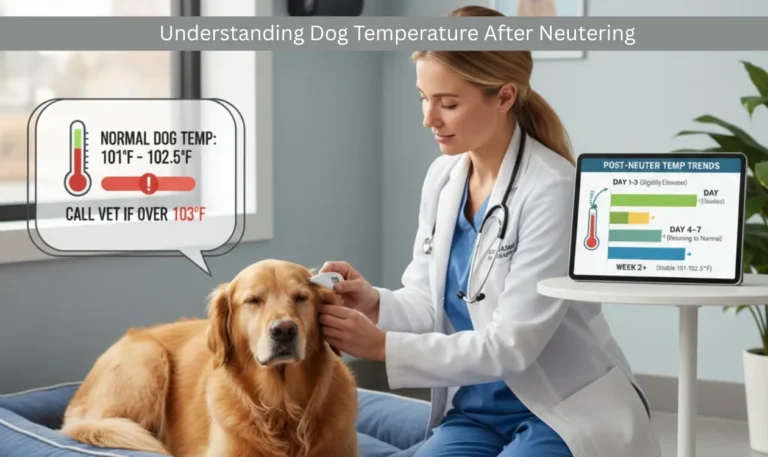Handling vomiting after surgery – Dog Care Guide
Handling vomiting after surgery requires careful monitoring, hydration, and calm care. Learn when vomiting is normal and when your dog needs urgent veterinary attention.
Postoperative dogs may experience mild vomiting or nausea on recovery and this can be a cause of fear to the pet owners. This is usually as a result of anesthesia that has the potential to disorient your dog temporarily. Typically it passes in a few hours but close attention is paramount. You should not feed your dog just after surgery but you should give small sounds of water to your dog after he is fully awake.
Once your dog begins to feel better you can gradually resume the feeding process, but in the early stages you should only feed him in small amounts on non-tasty food such as boiled chicken and rice. The first day should not be given any treat or heavy meals. In case vomiting goes beyond 12 hours or it seems to be serious, it is better to call your veterinarian for your dog care. Early check up will help to avoid any undetected problem and your dog will get better.
Aetiology of Postoperative Vomiting.
It could be that your dog vomited after the surgery for a number of reasons. The most common ones are the residual effects of anesthesia, taking medicine on an empty stomach, or swallowing blood during the procedure. All of these can have a temporary irritating effect on your dog’s digestive system. It is important to monitor their response to determine whether the cause is mild or requires veterinary attention. In some cases, postoperative vomiting may be linked to gastritis inflammation of the stomach lining that causes nausea and irritation
Vomiting may also be caused by anxiety or postoperative pain. Dogs may be confused or upset particularly when locked or kept at liberty. Having your pet in a calm, hydrated and quiet environment minimizes stress nausea. Never forget to have your vet prescribe the correct medications and also verify whether to take it with food or not to reduce stomach upsets.
When Vomiting Starts to Worry.
Short-term minor vomiting after surgery is not a reason to worry, although there are warning signs. In case vomiting does not stop after 12-24 hours or contains blood, it may indicate infection, internal bleeding or incorrect response to medication. Such warning signs are other symptoms such as being lethargic, dehydrated, or not having an appetite.
A dog should also not be left without you suspecting that their gums are pale or the animal will not even drink water. Such symptoms can be life-threatening to the veterinary care. Tests to determine the complications such as internal irritation or infection can be run by your vet. Do not attempt to cure persistent vomiting using homecare medications or over-the-counter medications without the advice of a healthcare professional.
Feeding Tips After Vomiting
It takes patience and care to feed your dog after he or she vomits. Start with ice cubes or little pieces of water so as to avoid dehydration. Unless otherwise, they can hold them down, on a dull diet of boiled chicken and rice in small, separated meals. This assists in filling their stomachs but it does not exhaust them.
You should not feed your dog fatty, spicy, or store-bought treats until your vet confirms it is safe to return to normal food. It is important to introduce meals gradually so your dog’s stomach is not overwhelmed. If vomiting begins again, stop feeding and visit your vet as soon as possible to prevent the problem from worsening. In some cases, repeated vomiting may be related to enteritis inflammation of the intestines that can cause nausea and digestive upset
Medication and Management of Vomiting.
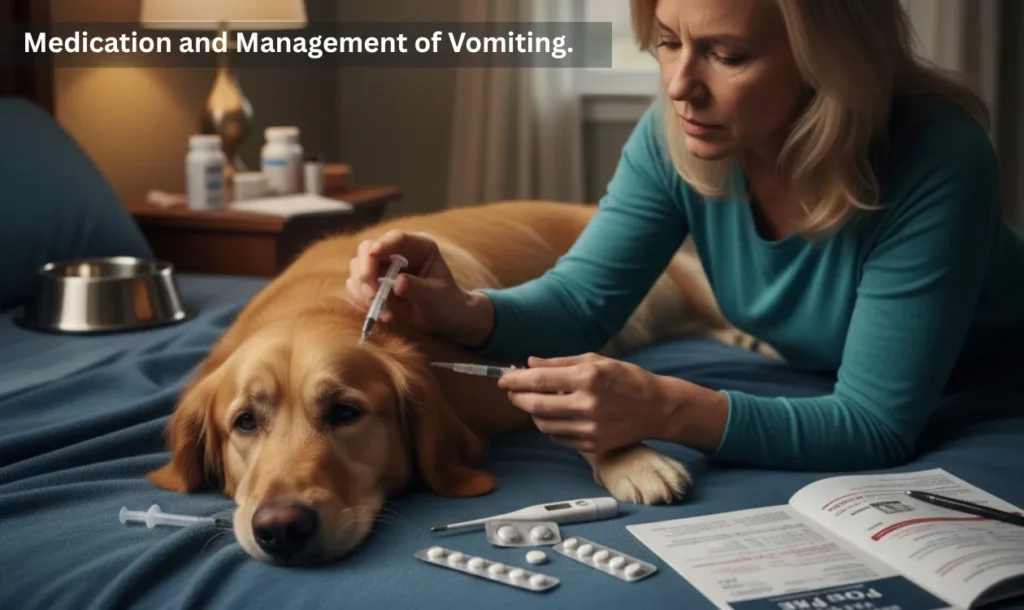
Nausea can occur after surgery particularly antibiotics or pain killers. Never administer medicines without first being directed to do so by your vet and never empty unless otherwise. In case vomiting occurs post medication, determine whether there is an alternative to the medication.
You can also ask your vet about anti-nausea medications that help calm your dog’s stomach. These drugs are often recommended to support anesthesia recovery. Do not change dosages or discontinue any medication without veterinary guidance, as this can delay healing or cause adverse effects. Understanding dog digestive issues is important to ensure safe and effective recovery.
Rehydration and Comfort during Recovery.
It is important to keep your dog hydrated every time he or she vomits. Drink small portions of fresh and cool water instead of big gulps, to prevent a further induction of nausea. One can use a couple of ice cubes to maintain hydration levels. After surgery, dehydration may take place very soon, particularly when vomiting persists.
Besides keeping your dog hydrated, make sure it is in a calm comfortable area. Keep them very still so as not to put strains to their stitches or aggravate their sickness. An atmosphere is conducive to quicker recovery and less sickness due to anxiety. Soft cushions and tender consoling help a lot in achieving comfort in their recovery.
How to track the recovery of your dog.
Observation can ensure that any aberrant signs are detected at an early stage. Monitor how often your dog vomits, their energy level, and their intake of food and water. Mild vomiting that improves within a day is usually not harmful. However, worsening symptoms or new signs such as diarrhoea or weakness require veterinary care. In some cases, these symptoms may indicate gastroenteritis inflammation of the stomach and intestines that can cause vomiting, diarrhoea, and lethargy
Another thing to look at when checking the health of your dog is the gums, they are supposed to be pink and moist. In case they are dry and pale, then your dog could be dehydrated and out of shape. These details should be recorded so that your vet can be able to diagnose the cause fast and correctly.
When to Contact the Vet
Vomiting should be regarded as common, with blood, and not resolved in 24 hours, and should make your vet involve. The symptoms could be an indication of infection, gastrointestinal upset or drug reaction. It is always advisable to be on the safe side than to jeopardize complications.
In case your dog looks lost, has a fever or appears to be hurt, then it is necessary to visit the veterinarian immediately. To avoid dehydration, your vet might recommend an exam or fluids. At an early age care makes sure that the problem is dealt with before it gets serious.
Preventing Future Episodes
In the future of your recoveries, always pay close attention to the feeding and medication instructions of your vet to avoid vomiting. Be careful when introducing food and do not administer food other than the one that is prescribed. Hydration, rest, stress-free environment are crucial in the prevention of nausea after surgery.
In addition, do not administer human medication or supplements to your dog. Certain chemicals may aggravate vomiting and can damage your pet’s internal organs. Your dog should be taken to the vet regularly after surgery to keep the healing process on schedule. Improper medication can sometimes lead to toxicity a harmful reaction caused by poisonous substances in the body.
FAQ: Handling vomiting after surgery
Final Thoughts
Postoperative vomiting may be very frightening, yet it usually is short lived and can be prevented through good medical care. The knowledge of the causes and recognition of when to get care can help avoid severe complications. The important things to your dog include gentle feeding, hydration and monitoring, which would see your dog recover easily.
Vomiting should never last longer than that: You should seek advice with your vet in case of other troubling signs. Be patient and watchful and your furry companion will soon be back on its feet again in as normal a state as ever.

